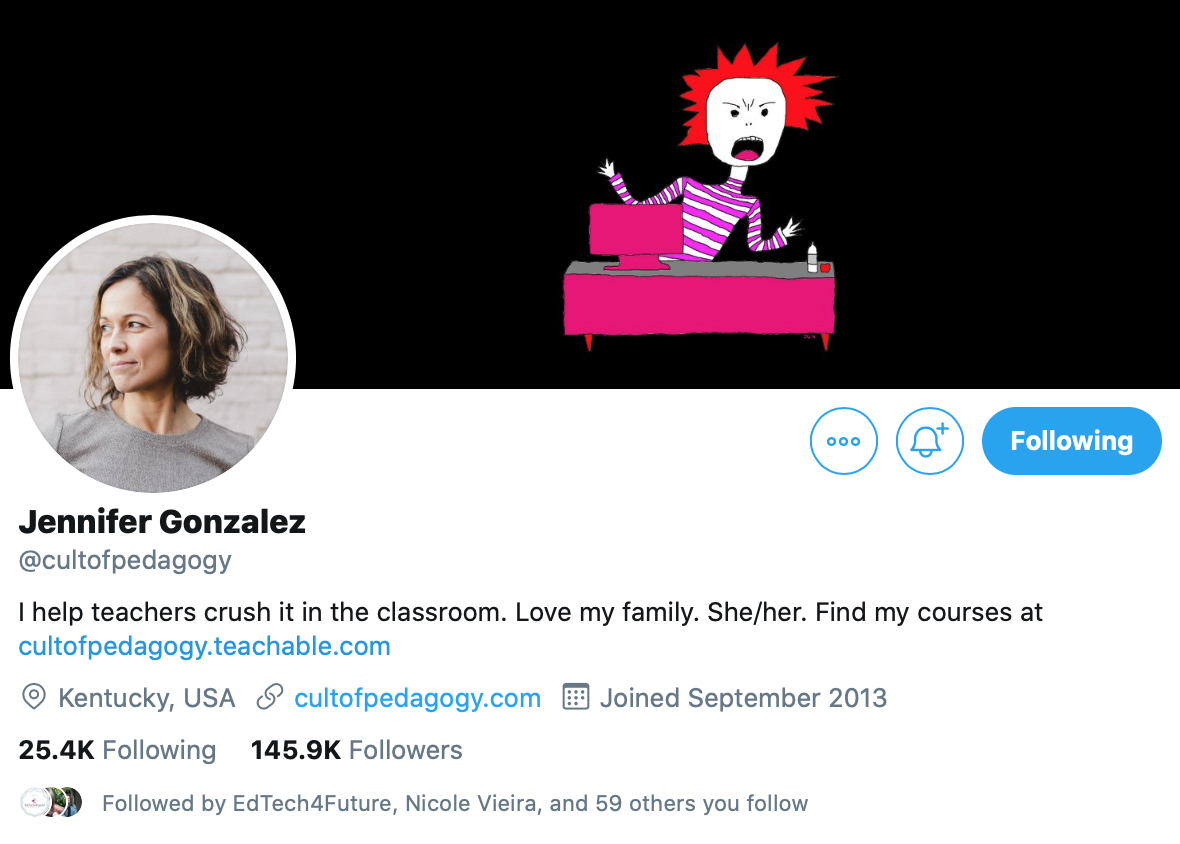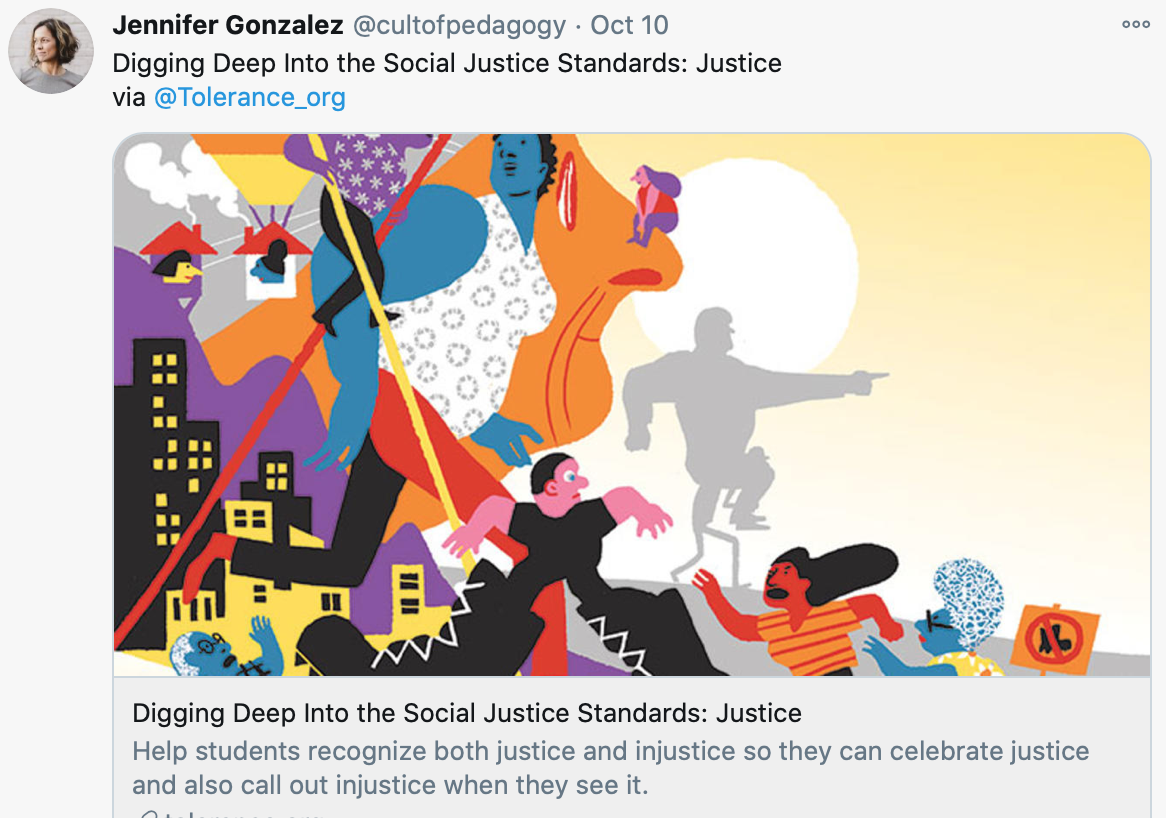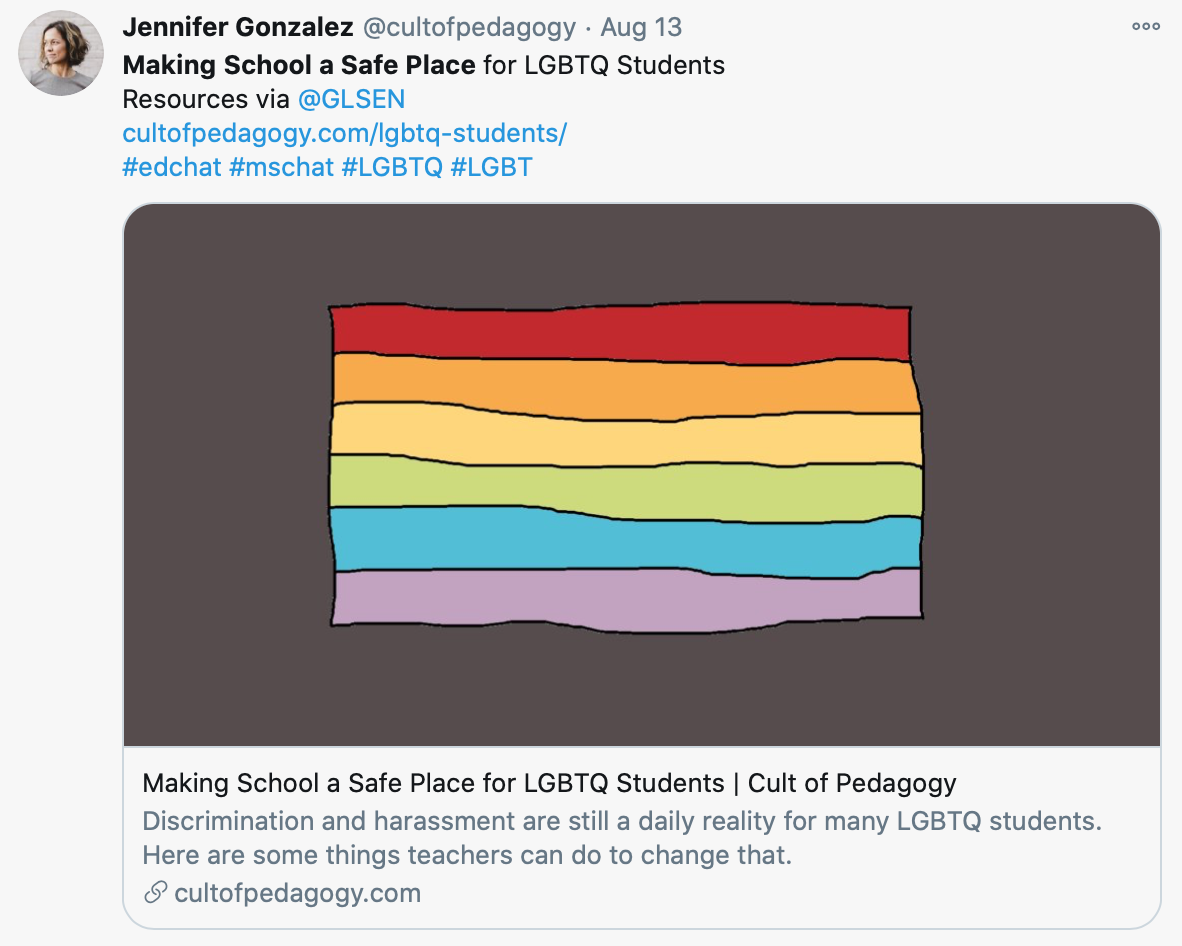
Jennifer Gonzalez is a former middle school language arts teacher in the United States and currently works with pre-service teachers to prepare them to build their practice. I came across her on Twitter when some colleagues whose opinion I deeply said that I should give her a follow. A few years later I still enjoy seeing her take on education.
My analysis will explore her tweets on a variety of themes; She touches on many areas of education, but I’ll be focusing on her original content that centers on social justice in the classroom and classroom strategies that improve teaching and learning. She also dabbles into teacher wellness, large-scale education reform, racial injustices more broadly in the United States,
WIll on occasion retweet from places like tolerance.org and edutopia.org, and I’d consider this low hanging fruit in the teaching twitter world, but still worthwhile to get an idea out there. I pay particular attention to her own content from her website or podcast as I find her opinions backed by experience and research. This is why I thought she would be a solid “tweeter” that connects theory to practice.
She currently has 146,000 followers that seem to be mostly from the education and teaching world, but from my quick scan (I didn’t look through all of them), they are global in scope. From what I gather, 150k followers is a lot in the education world. The kinds of people that she tends to follow are other movers and shakers in education, particularly those with progressive voices on topics like EdTech, education reform, and social justice within an educational context.

The first theme that I’ve pulled from her tweets is that of social justice in the classroom. In the following tweet, she shares an article from tolerance.org, an organization that is dedicated to developing a parallel curriculum that is meant to complement the common core standards in the US.
So why does this matter? I’m glad you asked. For someone who has an impressive platform like Mrs. Gonzalez, it’s an opportunity to affect real change beyond what any other teacher is capable of. I get the sense that she feels a real sense of responsibility; that she’s keenly aware of just how many teachers are listening to her. By forwarding an article that digs into the social justice standards, this saves time and simplifies the process for busy educators. It’s also important to mention that she holds a lot of credibility with her audience, given the fact that she was a “boots on the ground” teacher for so many years.
In another tweet, she talks about making schools a safe place for LGBTQ students. I know she lives in Kentucky which isn’t exactly a beacon of social progression. I can speak to this personally as I attended university in the southern US and witnessed this first hand. As Gerdin (2020) points out, teaching about social justice issues isn’t enough; teachers must teach and model social cohesion, the importance of diversity and difference, and why and how we address social inequities.

Here, she cuts right to the heart of what teachers can do in order to reduce the discrimination that LGBTQ experience in schools, in an easily digestible format. Because of this, Twitter affords educators who don’t necessarily have the time (or cognitive energy) to delve into research a way to access some of the latest ideas coming out of academia. In a meta kind of way, Twitter is a tool for academic equity for educators, so that educators can learn how to exercise equity in learning in their classrooms.
The most dominant theme in her content is classroom strategies to improve teaching and learning. Again, what I love about this format, is the ability to cut through the weight of academic research, action research, and the experiences of veteran teachers. As those in the business know, teaching can sometimes feel like you’re on an island by yourself, doing your best to put it all together and make it work.

This next tweet links to an article on her website that outlines classroom strategies that are backed by research. I think it’s important to note that I hear the phrase “supported by research” all the time, which is understandably hard to explain in a collegial conversation. (Do I just start listing references verbally?) In this post, she outlines the activities that cognitive scientists have pinpointed as optimal for storing information in long-term memory, also known as learning. Something I deeply appreciate about her work here is the fact that her content doesn’t propose sweeping changing to an existing practice; it somehow feels like a gentle reminder of ideas that we already knew, at least for myself anyway.

In another post, she discusses the power of note-taking as summed up by research (prefer the term note-making as per Brownlie & Schnellert (2009), but that’s a story for another day). In the article itself, she references seventeen different studies relating to note-taking, which lends itself much more credibility than tweeting in all caps “STUDENTS NEED TO LEARN TO TAKE NOTES BECAUSE IT TEACHES DISCIPLINE” or something along those lines. There is a strong through-line in her work, one that almost always comes back to the thinking and wellbeing of students.

The last tweet I’d like to address broaches a topic that I’m certain almost every teacher has thought about at some point, and those that haven’t really need to. The validity of assessment. With this post, it appears as though she is attempting to shed some light on assessment to those teachers that may be just assigning busy work, without much thought into why. I think it’s worth mentioning the tone of her work here. She isn’t posing an all-out assault on your practice per se, but rather she is using more friendly language to get you to do some introspection on whether or not your assessments are measuring what you think they are, among other things.
When I first considered this assignment, I wondered whether or not I should focus on educationalists like Dylan Wiliam or John Hattie, but instead elected to go with someone a little closer to the field of play, so to speak. Her writing isn’t littered with debates about the legitimacy of effect sizes, sample size, or whether the treatment relates to actual classrooms. Not to say those aren’t important – they absolutely are, but Jennifer helps everyday teachers separate signal from noise, and in a time when teachers are busier than ever, her voice is a breath of fresh air.
References
Brownlie, F., Schnellert, L., & ProQuest (Firm). (2009). It’s all about thinking: Collaborating to support all learners, in english, social studies, and humanities. Winnipeg: Portage & Main Press.
Gerdin, G., Larsson, L., Schenker, K., Linnér, S., Mordal Moen, K., Westlie, K., . . . Philpot, R. (2020). Social justice pedagogies in school health and physical education-building relationships, teaching for social cohesion and addressing social inequities.International Journal of Environmental Research and Public Health, 17(18), 6904. doi:10.3390/ijerph17186904
